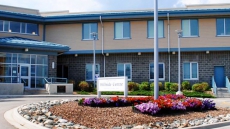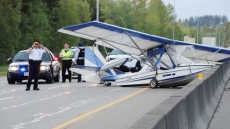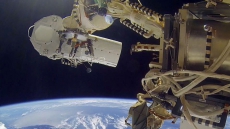Canadians in Nepal and relatives of missing Canadian tourists are expressing frustration with Canada's response to Saturday's massive earthquake, with some complaining they're getting more support from American officials than their own.
Mark McDermott and Roel Teunissen were hoping to get on a military transport plane on Wednesday to return to Canada from the earthquake-ravaged country.
But McDermott said Tuesday they've now been told the plane will only take evacuees to New Delhi, where they'll have to find commercial flights home on their own.
That would leave them in a worse situation than they currently have in the U.S. embassy in Kathmandu, where his group and many others have gathered while they await their scheduled flight on May 17, he said. In New Delhi, however, they'd likely have to camp out at the airport.
Defence Minister Jason Kenney said a military aircraft loaded with personnel and supplies was expected to arrive in Nepal on Wednesday, but added that depends on the condition of the damaged airport.
McDermott said neither he nor Teunissen will go to New Delhi, and they haven't heard of any other evacuation efforts. He added there's been a dearth of information from Canadian officials.
Teunissen said once they were able to contact the Canadian consulate after the quake, the honorary Canadian consul told them it was a very big emergency and they weren't equipped to handle it at the consulate. He said the honorary consul, a Nepalese man, told them to seek help elsewhere.
However, the honorary consul's assistant in Kathmandu told The Canadian Press by telephone early Tuesday that he "doubted the consul would have said that."
"That's not our policy; we don't ask people to just go away," added the assistant, who said he was not authorized to comment and did not want his name used.
Foreign Affairs Minister Rob Nicholson was asked directly Monday about reports of Canadians being turned away from the consulate when they sought assistance.
He would only reply that he has instructed the honorary consul there "to work with these individuals on a 24-hour basis to get them the help that they need." Nicholson added that officials from the high commission in New Delhi have twice tried to land in Kathmandu but were turned away.

In the meantime, an email from Foreign Affairs to Canadians in Nepal said they should "consider leaving using available commercial means." It said Canadian officials "are working on plans to assist Canadians who are unable to leave via commercial means and require evacuation using DND flights."
After leaving the Canadian consulate, McDermott said they called the U.S. Embassy, which arranged a drive over, a place to sleep, food and the ability to communicate with family and friends. They've been told they can stay until their flight mid-May.
Kandy Barker said her nephew, Fraser, was also initially turned away by Canadian officials in Kathmandu as he sought news of his parents, who haven't been heard from since the earthquake struck. But he is scheduled to meet with officials today, she said.
Bruce and Kathy Macmillan, of St. Albert, Alta., were trekking in the Langdang region and were supposed to meet up with their two adult sons in Kathmandu on Monday, she said.
Talking to officials in Ottawa hasn't proven any more helpful, Barker said. Her sister called a government hotline for people whose relatives are still unaccounted for and got a "standardized, formatted" message, she said.
"The government told her, 'Go to social media and put the name out on Facebook and Twitter,'" Barker said. "OK, we've done that, but we need more from the government."
Michelle Dack of Victoria said Monday that her dealings with Foreign Affairs have been "disappointing" as she tried to get word of her sister, who was trekking in Nepal.
Dack said she and her mother did receive a very brief phone call from Tamara McLeod later Monday from Briddhim in the Langtang region, about 50 kilometres north of Kathmandu.
"She was bawling her eyes out, saying she can't get out — she's trapped," Dack said in a telephone interview early Tuesday.
But Dack couldn't say if that meant her 24-year-old sister was trapped physically or if a road is blocked, nor could she say if her sister was injured or had any food or water. The Dacks have had "difficulty being able to get clear answers" from Foreign Affairs, she said, and argued that Canada should be sending rescue workers to Nepal.
"I think they need to be in Langtang and also in Annapurna doing search and rescue. I know that there's many Canadians for sure that are in Langtang."
Dack said her sister is in Nepal to provide yoga workshops starting May 1 and had left Kathmandu on April 13 to take part in a trek.
"I won't sleep until I know that my sister is on a helicopter," she said.

Sarah Brandt of Ottawa said she's been having no luck getting word about her brother, Saijaya Raj, who was trekking in the Langtang area when the quake hit.
Raj is Malaysian and Brandt said she's been unable to contact the Malaysian embassy other officials in Nepal and hopes more media can get into the quake area to tell those outside of Nepal what is happening.
"The most important part is to find my brother and whatever source that can help me to do that I will be very happy to receive help from," she said.





